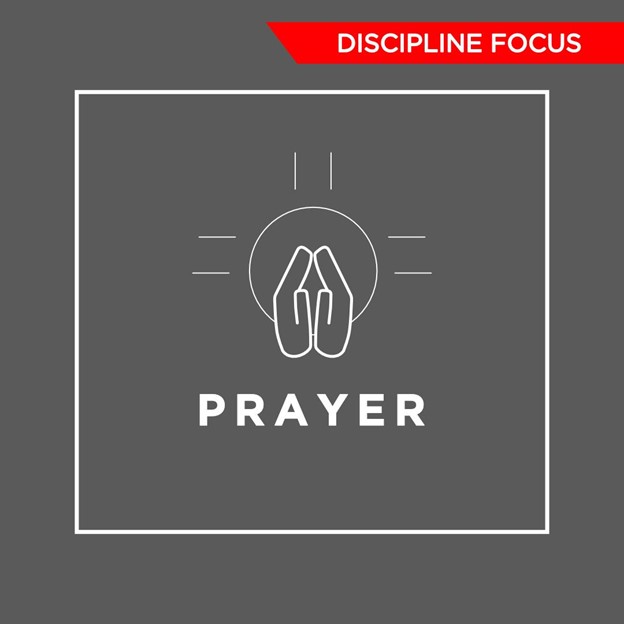As apprentices or followers of Jesus, we follow His patterns as modeled in His life, death, and teachings for us. These practices are sometimes called “spiritual disciplines” or “habits of grace,” and their aim is to assist us in abiding in Christ to the glory of God.
Bible Intake
[January] The discipline of Bible intake is about the practice of hearing from and submitting to the revelation of God. God’s word, the Bible, is the infallible and inspired word that He breathed out and has been preserved for us to hear directly from Him. He is not only our good Creator, but He is also omniscient (all-knowing) and omnipotent (all-powerful), so we listen to and read Scripture knowing it is authoritative and life-giving for us as His beloved children.


Prayer
[February] The discipline of prayer is about communing with God. As Bible intake is God’s communication to us, prayer is our communication to Him. This often takes the form of thoughts or words directed at God, but it is largely about our hearts and lives being rightly postured before God. God is sovereign over all and is unchanging, but in a beautifully paradoxical way has decreed that our prayers affect real change in our lives and the world around us. He listens and He responds in His timing and way, wanting to hear from us.
Confession
[March] The discipline of confession is an integral part of our healing as we live on a broken planet as broken people. There are two directions of our confessing – vertical to God and horizontal to our brothers and sisters in Christ. Both forms of confession are freeing for us. God promises to forgive us and cleanse us of our sin in response to our vertical confession to Him. In our horizontal confession to others, we find the freedom to walk in light with accountability, encouragement, and reconciliation.


Celebration
[April] The discipline of celebration is rooted in the repeated biblical commands to have joy and rejoice. Knowing Christ has won the victory over sin, death, and evil gives us great joy. This joy and reason for rejoicing is unshakable because in His victory He has ultimately given us Himself– He is our joy!
Fasting
[May] The discipline of fasting is an intentional way to grow our desire for and reliance on God. As we purposefully create a void in our life by abstaining for a set amount of time from something we would normally consume or engage with like food or social media, we are reminded to turn to God who truly satisfies with every craving or impulse calling us to what we are abstaining from. Fasting is a good ongoing discipline for developing self-control, fighting selfishness, and increasing intimacy with God as we long to hear from Him or simply be near Him.


Service
[June] The discipline of service is a reflection of the heart of Christ who said He came not to be served, but to serve. Serving is tangibly expressing our love for God and others. We also serve to rightly bear the image of God, in whose image we were made, so that the world would ultimately know and glorify God.
Meditation
[July] The discipline of meditation is the practice of filling our minds with truths of God, pondering them for greater understanding, appreciation, and application. This is quite different from the common form of meditation in our surrounding culture that aims to empty one’s mind in meditation. Meditation includes the memorization of Scripture so that it is always present with us in our hearts and minds.


Simplicity
[August] The discipline of simplicity aims to clarify and reinforce the mission of God in our lives. The complexity of our lives often hijacks our vision for who and where God wants us to be, so simplifying our lives serves to make room for what matters, whether that be tangibly, emotionally, mentally, or however else needed. When we simplify things, we can focus.
Worship
[September] The discipline of worship is about intentionality. We worship through various forms that include the typical corporate worship gathering elements like singing, preaching, and giving, but worship is something done in spirit and in truth that is really about the heart and a life that is being willingly laid down for God in view of His mercy. This means that every single thing we can do, no matter how mundane or seemingly unspiritual, can be and should be an act of worship. We aim to make everything Godward in worship.


Generosity
[October] The discipline of generosity is yet another reflection of the heart of God, the giver of all good gifts. This discipline calls us to remember and apply the principle that it is okay to own things, but not okay for them to own us. To be generous is to live open-handed, not holding tight to our varied resources because we are putting our hope, security, or identity in them, but seeing that we have simply been entrusted with things by the One who owns all things in order to enjoy and use them for His purposes.
Community
[November] The discipline of community is an acknowledgement that we are created as social-relational beings as made in the image of the Triune God who has enjoyed community throughout eternity. It is in community that we can carry out the “one-another” commands of Scripture. We participate in community, remembering that God made us a new people for His glory, not just new persons. Critical to being in community is gathering in various ways, because we know that it is when we are together that we can spur each other on to love and good works.


Sabbath
[December] The discipline of sabbath is ultimately about rest. We can ultimately rest because of God’s grace. In this regular rhythm of stopping to rest, we cast our anxieties on Him, knowing He will provide and can do infinitely more than us finite creatures can, and we intentionally pursue the Lord in worship that reorients us and focuses us back on what matters most. Included in this discipline are practices that defy our cultural norms like intentional silence and solitude.
